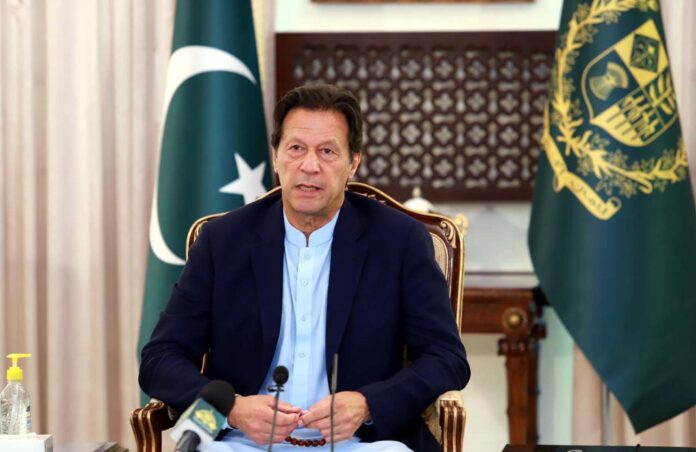ISLAMABAD: Prime Minister Imran Khan on Monday urged industrialists to ensure implementation of standard operating procedures (SOPs), adding that the government has to maintain a balance between economic activities and preventive measures against coronavirus pandemic.
The prime minister said this while talking to Federation of Pakistan Chambers of Commerce and Industry (FPCCI) President Mian Anjum Nisar and vice presidents Dr Muhammad Arshad and Qaisar Khan Daudzai in the federal capital.
He said that the government has allowed industries to continue work, however, industrialists should ensure implementation of preventive measures against coronavirus. He asked the FPCCI office-bearers to ensure implementation of SOPs.
The president FPCCI presented a cheque of Rs20 million for Corona Relief Fund to the prime minister.
The delegations apprised the PM of the positive results of the government’s impetus package and also suggested some means to further boost the industrial sector on the line of construction industry package. Qaisar Khan highlighted the issues related to industry in Khyber Pakhtunkhwa (KP) and newly merged tribal districts. The premier welcomed the suggestions.
Separately, PM Imran formally launched Ehsaas Emergency Cash Programme for those rendered jobless due to coronavirus.
He visited an Ehsaas cash distribution site set up at the Pakistan Sports Complex and met with the first batch of job-loss/livelihood-loss affectees, who received the emergency cash assistance of Rs12,000 each through the system.
On the occasion, he inquired from different people about the financial impacts in the aftermath of Covid-19 pandemic. A number of affectees apprised him about their issues and expressed gratitude to the prime minister for the financial support through the cash programme.
PM Imran said that the government took various decisions for maintaining continuity in economic activities and had opened different sectors for the same purpose.
Minister for Industries and Production Hammad Azhar, PM’s Special Assistant on Social Protection and Poverty Alleviation Dr Sania Nishtar and other senior officials also accompanied the prime minister.
Dr Sania briefed the Prime Minister about the whole process. She told the first batch of beneficiaries that the country was passing through difficult times and assured the government’s support to the vulnerable segments of society. She also urged people to adopt precautionary measures.
According to details, the donations under the Corona Relief Fund are being utilised by Ehsaas Emergency Cash Programme for the deserving affectees. Rs12,000 is being given to each individual.
As of Monday, as many as 3.4 million applications had been received via Ehsaas Labour Portal since the prime minister launched it on May 2.
More than Rs3 billion have been mobilised so far in the PM’s COVID-19 Fund and the pledges continue to be realised. The prime minister had committed that for each rupee donated by the donors, four rupees would be committed by the government.
In the interest of transparency, details about the disbursement and withdrawal would be made public.
Abdul Razzaq, an affected driver of Bara Kahu, told APP that he was jobless for more than two months and expressed his gratitude to the government for the financial support.
Shahida, a tailor from Rawalpindi, also expressed her satisfaction over the cash support and praised the prime minister for the initiative.
On Saturday, the Economic Coordination Committee (ECC) had approved a Rs75 billion emergency cash assistance package for labourers impacted by the COVID-19 pandemic, under which they would be provided Rs12,000 a month.
The prime minister had announced on May 3 that funds collected through the PM’s COVID-19 Pandemic Relief Assistance Fund 2020 will be used to assist labourers whose livelihood has been affected due to the lockdown and its impact on the economy.




